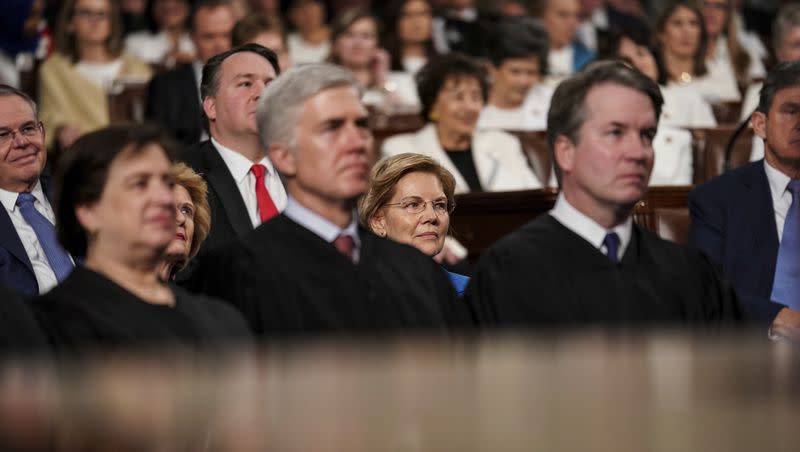The Supreme Court’s new code of conduct, explained

- Oops!Something went wrong.Please try again later.
- Oops!Something went wrong.Please try again later.
As concern grows over how private friendships affect the Supreme Court’s public work, the justices have adopted an ethics code, albeit one without a clear enforcement mechanism.
The new code of conduct, released Monday, “leaves compliance entirely to each justice,” according to The Associated Press. It also does not significantly change the controversial ethical norms that were already in place; instead, it just puts them in writing.
“For the most part these rules and principles are not new,” the justices explained in the unsigned statement that accompanies the new code of conduct.
What’s new is having a written version of the rules that’s released to the public, the statement explains.
“The absence of a Code ... has led in recent years to the misunderstanding that the Justices of this Court, unlike all other jurists in this country, regard themselves as unrestricted by any ethics rules. To dispel this misunderstanding, we are issuing this Code, which largely represents a codification of principles that we have long regarded as governing our conduct,” the justices wrote.
Among other things, the code of conduct requires Supreme Court justices to:
Obey the law.
Ensure that friends, family members, or professional or personal connections do not sway their legal work.
Not discriminate on the basis of race, sex, religion or national origin.
Recuse themselves from cases they cannot approach impartially.
Avoid using nonpublic information gathered during their legal work for their personal benefit.
Comply with the rules on accepting gifts like free trips laid out in the Judicial Conference Regulations, a preexisting document governing judicial affairs.
Related
What Justice Thomas said about his controversial trips on a private jet and superyacht
The Supreme Court’s latest gun rights case — and its link to domestic violence
The court’s new ethics document comes seven months after ProPublica released an in-depth investigation into Justice Clarence Thomas’ relationship with Republican megadonor Harlan Crow, which questioned why the judge had not included vacations paid for by Crow on his financial disclosure documents, as the Deseret News previously reported.
ProPublica and other outlets have since released many more stories exploring current disclosure rules and other ethical norms. The stories have prompted calls from Democratic leaders in Congress and others for the court to clarify its policies and allow for more oversight.
The people behind these calls for change were not satisfied by Monday’s announcement, according to The Associated Press.
“Sen. Dick Durbin, D-Ill., chairman of the Senate Judiciary Committee, ... said Monday that the code appears to fall short of what is needed,” The Associated Press reported.
Sen. Sheldon Whitehouse, D-R.I., who is sponsoring a bill that would impose new ethics rules on the court, described the code of conduct as “a long-overdue step” but added that the justices need to agree to an enforcement mechanism, according to The Washington Post.
“The honor system has not worked for members of the Roberts Court,” Whitehouse said.

